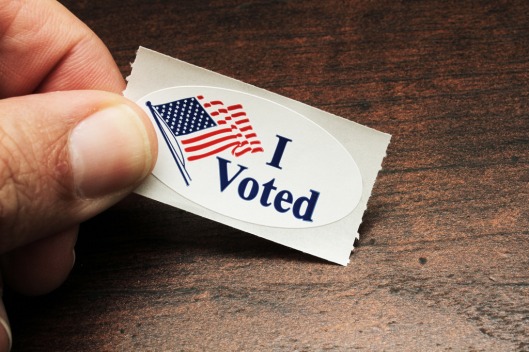In a rare glimpse of mettle since she conceded the race to Donald Trump last November, Hillary Clinton showed up for Donald Trump’s inauguration with a smile. She seemed to want to show the world: Hillary Clinton may have been knocked to the mat but she’s not down for the count. That initial smile, though winsome, was too wide to be genuine (the lady doth smile too much, methinks) and quickly turned glum.
By the next day, when Women’s Marches clogged streets in cities across the nation and the world, Clinton had faded from view again except for this tweet:
Thanks for standing, speaking & marching for our values @womensmarch. Important as ever. I truly believe we’re always Stronger Together.
Did she think it would be in bad taste to give a speech, rouse the marchers, and walk alongside the hundreds of thousands of men and women who turned up to express their outrage at Trump’s sexist remarks and behavior (“Keep your tiny hands off my pussy” one sign said) and send a message to him and other elected officials that anything less than 100% respect for women’s rights will not be tolerated? This conundrum did not prevent John Kerry from joining the march.
As she watched the March from her home, was Clinton angry that some (many?) of the marchers had failed to realize what was at stake in the Presidential election until it was too late? Or, was she angry that some (many?) of the marchers had failed to vote? Such pettiness is surely beneath her.
Clinton has overcome body blows before—husband Bill’s affairs, Monica, her health-care plan as First Lady, losing to Obama in 2012. Although few challenges are more painful than career ‘catastrophes,’ with each setback, Clinton found her way to transcend the pain and return to serving the greater good. Will she yet again?
No doubt, her deep faith in God and her lifelong commitment to the United Methodist Church’s social-justice values have helped her overcome these tests. After all, her favorite quote from her beloved John Wesley, the founder of Methodism, is this:
Do all the good you can. By all the means you can. In all the ways you can. In all the places you can. At all the times you can. To all the people you can. As long as ever you can.
Clinton can still do much good.
Wesley himself could serve as her inspiration for another comeback. Though he remained an Anglican minister—he never granted that his teachings had created a religious offshoot—his controversial teachings led congregations to bar him from their pulpits. He faced ongoing trials and disappointments but he kept on keeping on; by the end of his life, he had earned such widespread respect that some described him as the best-loved man in England.
In recent memory, President Jimmy Carter, a person of great piety like Clinton, resurrected his reputation. After he lost the Presidential election to Ronald Reagan, Carter refused to hide his pain and humiliation by retreating from public view. Within two years of his defeat, he had founded the Carter Center, with a focus on human rights.
Determined to continue working to advance rights and reduce suffering, Carter used his high-level connections to play a helpful role in world events. He made himself invaluable by mediating conflicts in countries like Haiti, Bosnia, and Ethiopia. His name became associated with an ability to resolve messy conflicts between intransigent governments.
Perhaps Clinton has not yet decided what future to craft for herself. What is certain, however, is that the longer she remains on the sidelines, out of view, the harder it will be for her to emerge—like a kid who takes a tumble on a slide, she needs to climb back up the ladder. The Women’s Marches proceeded without her. Will she now have to elbow her way into the circle of leaders responsible for those Marches’ planning and execution?
Professors Jeffrey Sonnenfeld and Andrew Ward who have researched career disasters among business leaders found that leaders who fail to overcome these disasters are plagued by two issues: they tend to blame themselves and they tend to revisit the past instead of focusing on the present and the future.
Clinton knows she made mistakes running her campaign. She focused on Trump’s character instead of focusing on issues of concern to the discontented white middle class. She listened to the advice of staffers instead of listening to Bill, a seasoned campaigner who pleaded with her to spend more time visiting rural areas and talk to the kind of folks who had voted for him.
Sonnenfeld and Ward also found that the business leaders who overcome catastrophic setbacks do so if, like Jimmy Carter, they take intentional steps to achieve this goal. These steps, according to these researchers, are the following: decide how to fight back; recruit others into the fight; take steps to recover your ‘status;’ prove to yourself and others that you have the ‘stuff’ to reclaim your place at the top. They stress that the journey must be seen as a fight. Those who disappear into the void choose flight or simply don’t fight back.
Sometimes deciding how to fight back can mean taking a tactical retreat. But, whether one chooses to retreat for a while or begin the fight immediately, it is essential, Sonnefeld and Ward write, to “engage others right from the start to join your battle to put your career back on track.”
Perhaps Clinton is in fight mode and, behind the scenes, engaging her vast network of friends and acquaintances. Perhaps she is focusing on the fact that she won the popular vote and reaching out to key players to help her with her fight to resume the work of doing more good. Perhaps she is plumbing her faith for the courage to take the next step.
But why wait to craft a narrative? Why wait to remind the world of the super-star status she achieved as Secretary of State? Instead, she is allowing herself to be viewed, increasingly, as brooding and wounded. The time has come to start managing her status on social media.
Come out, come out, wherever you are, Hillary Clinton. Don’t miss the next Women’s March; take your place in the lead where you belong.


